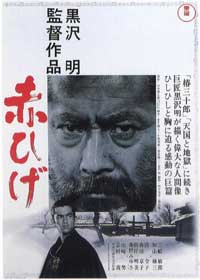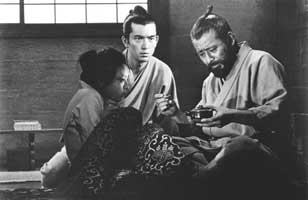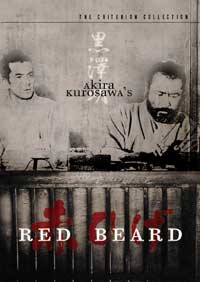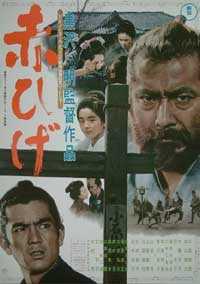 Akira Kurosawa claimed to have become alarmed with the violence that had come to dominate samurai films, even though he himself was signal in triggering such violence with that never-seen-before but often-seen-after shocking spray of blood at the end of Sanjuro (1962) & the lengthy scenes of samurai vs bandit carnage in Seven Samurai (1954). He made Red Beard (1965) as evidence that a good period film was achievable without violence. Akira Kurosawa claimed to have become alarmed with the violence that had come to dominate samurai films, even though he himself was signal in triggering such violence with that never-seen-before but often-seen-after shocking spray of blood at the end of Sanjuro (1962) & the lengthy scenes of samurai vs bandit carnage in Seven Samurai (1954). He made Red Beard (1965) as evidence that a good period film was achievable without violence.
He somewhat failed, not because the intent wasn't possible, as there are in fact plenty of non-violent samurai films, like Humanity & Paper Balloons (1936), that are carried along on the strength of their characters without need of action scenes, & that tradition survives in recent samurai films by Yoji Yamada from Twilight Samurai (Tasogare Sebei, 2002) to Love & Honor (Bushi no ichibun, 2006).
The first western-trained doctors in Japan were of the samurai class, searching as they were for new positions of consequence as the age of the samurai was coming to a close. Kurosawa's hero is a samurai by class, but not a warrior; by profession he's a physician, played gruffly by Toshiro Mifune. He turns in a great performance, but the film comes off as two-thirds a soap opera about the simple lives of villagers who move like satellites through & around the physician's life. Approaching three hours in length, it's terminal for the butt, & all those intersecting village soap stories view like excess padding of the sort one gets in a television mini-series.
There's also a mentoring relationship between Red Beard & his arrogant young assistant doctor who still has a lot to learn. This relationship is moderately interesting, but it was old-hat even in 1965.
Because Kurosawa really doesn't like peasants -- at his best, he pities their plight as a human being pities an abused dog -- so his exaggeratedly compassionate Red Beard resounds with phoniness. Red Beard is a giant surrounded by little worms, like Kurosawa the Taisho (Emperor) surrounded by little actors & little crew. His commoners are miserable, ignorant, or depraved, & do not learn or grow.
The greatness of Red Beard the man is that he can treat these pieces of crap like worthwhile humans, & teach his prideful assistant in time to do likewise. This is called noblise oblige, when the upper classes are polite to people beneath them, but Kurosawa never for a moment ever questions the validity of a class system that assumes only the upper echelons are decent people. It's too easy to tell Kurosawa doesn't like "regular" people, & that the existence of so tolerant a man as Red Beard is hardly more than the director's misguided self-agrandizement at the expense of nearly every other character's dignity.
 When Red Beard has his judo "action" sequence, it does brighten up a dismal film, but it's not well integrated with the story, it's just tacked awkwardly onto a film that required either a lot more action with better context, or none at all. The token action would seem almost a confession on Kurosawa's part that he really didn't know how to achieve his goal of a period film sustaining interest without recourse to violence. When Red Beard has his judo "action" sequence, it does brighten up a dismal film, but it's not well integrated with the story, it's just tacked awkwardly onto a film that required either a lot more action with better context, or none at all. The token action would seem almost a confession on Kurosawa's part that he really didn't know how to achieve his goal of a period film sustaining interest without recourse to violence.
Though the film is elegantly shot in black & white, Kurosawa insisted Mifune actually dye his beard red for on-set realism. It took a horribly long time to finish the film & throughout that time Mifune could accept no other film work because no one else needed him to have a beard, let alone a beard dyed red.
Mifune complained at being in a holding pattern awaiting future film schedules for Red Beard, stuck with a beard that kept him from being able to work on any other project. Kurosawa became outraged that anyone had the nerve to stand up to his sometimes unreasonable demands. Like a jilted lover -- or like a daimyo criticized by a vassal -- he completely lost his own phony noblesse oblige & let it be known that Mifune was only well known because Kurosawa made him, & he should not be appearing in so many lesser directors' films at all.
He serioiusly regarded himself as above everyone, which is why he liked to be called "Taisho," & his actors were his vassals better off dead than undutiful. Most actors condescended to him in all cases, as it was indeed a rich opportunity to appear in his films, & no one was ever made happy by being on his shitlist.
An unstable genius at best, with suicidal tendencies when he could not busy himself filmmaking, Kurosawa refused ever again to work with Mifune, though their association had been mutually beneficial & almost magical & he damaged his own career by jettisoning his greatest asset. In years to come Mifune made motions to heal the rift, as Mifune was in his life a humble man with a great heart who would take risks for others than himself. But The Magnificent Taisho would inevitably fall into a pattern of angry criticisms of Mifune as an ingrate. Mifune remained throughout the bigger man.
 As far as I'm concerned, Red Beard was at best pretendiously mediocre. What a shame that there'd be a lasting falling out over a film scarsely any less trivial than the many which Kurosawa believed Mifune should never have appeared in at all. As far as I'm concerned, Red Beard was at best pretendiously mediocre. What a shame that there'd be a lasting falling out over a film scarsely any less trivial than the many which Kurosawa believed Mifune should never have appeared in at all.
The passion Mifune invests in the character of Red Beard is the film's chief saving grace, & if it had starred just about anyone else it'd lose whatever appeal it drums up.
Many Kurosawa fans regard this as a masterpiece so there certainly are other understandings of its merits, but to me the story is simply uninteresting & its compassion fake. The best I can say for it is the painterly look of the sets & tableaus are occasionally stunning, if a little unreal & overwrought in design. Prettiness of the black & white cinematography is not a sufficient substitute for an arresting tale.
Kurosawa's non-violent masterpiece is Ikiru (To Live!, 1952), but that is a modern setting, & he never did make a great period film without swords & action. His script for After the Rain (Ame agaru, 1999) was filmed posthumously by Takeshi Koizumi (Kurosawa's assistant director), & it just about achieves what Red Beard attempted, coming closer to Twlight Samurai than Seven Samurai in tone & execution.
Perhaps Red Beard was noble in intent, but it's also quite possible that Kurosawa was not at that time in a healthy enough state of mind to have a clue how to remove most of the action from a samurai film & have something worthwhile that remains, no more than he ever knew what to do with his own life when filmmaking was removed from it & he became suicidally depressed.
copyright © by Paghat the Ratgirl
|

